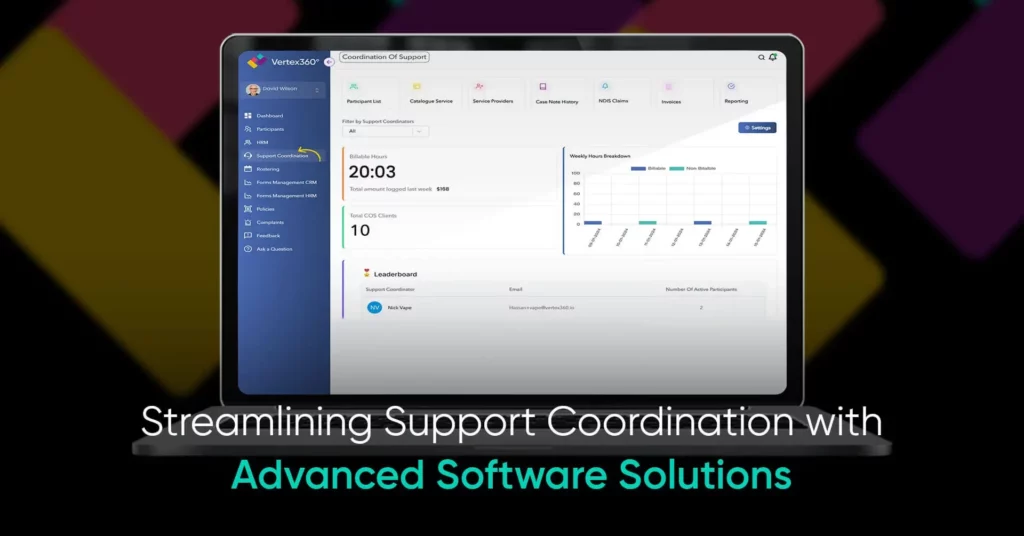Streamlining Support Coordination with Advanced Software Solutions
Support coordination plays a vital role in helping NDIS participants access the right services to achieve their goals and maintain independence. The process involves managing service providers, tracking funding, and ensuring compliance with NDIS guidelines. With increasing demands and a complex system to navigate, it’s essential that support coordinators have the right tools to simplify the process, reduce manual workloads, and improve service delivery. The Role of Support Coordination in NDIS Support coordination connects participants to services and resources in their NDIS plan. It involves collaborating with service providers, ensuring that appropriate supports are in place, and assisting participants with managing their funding. Effective coordination leads to better outcomes for participants, improving their experience and ensuring the services align with their goals. For service providers, managing these tasks effectively and in compliance with NDIS guidelines is crucial to delivering high-quality care. Without the right tools, support coordination becomes time-consuming and error-prone, ultimately impacting service quality and efficiency. Key Features of NDIS Software for Support Coordination Centralised Data Management Centralised data management is a core feature of NDIS software. With it, coordinators can store all participant details—service plans, goals, and progress—securely and accessibly. Real-time information tracking enables better-informed support and reduces the risk of data discrepancies or missed updates. This streamlined process enhances the overall service delivery. Seamless Integration with Service Providers Coordinating multiple service providers can be challenging. NDIS software solves this by connecting all relevant providers, enabling smooth communication and collaboration. Whether it’s therapy services, personal care, or community engagement, software ensures that all support services are aligned with the participant’s needs, allowing for better planning and delivery. Simplified Billing and Invoicing NDIS software simplifies billing by automating invoicing and ensuring the correct fees are applied according to the participant’s NDIS plan. Automation reduces administrative burdens, minimising errors and freeing up providers to focus more on care delivery than paperwork. Real-Time Reporting and Compliance Tracking Staying compliant with NDIS regulations is essential. NDIS software provides real-time reporting tools to help organisations adhere to funding limits, billing practices, and regulatory requirements. It tracks all relevant data, making reports ready for audits and reducing the likelihood of non-compliance issues. This ensures smoother audits and funding claims. Enhanced Communication and Collaboration Effective communication is key to successful support coordination. NDIS software offers real-time updates, notifications, and reminders for all parties involved. It ensures everyone is aligned, reduces misunderstandings, and improves service delivery efficiency. How NDIS Software Solutions Improve Service Delivery Implementing NDIS software helps ensure that participants receive timely and accurate services. Coordinators can track goals, monitor progress, and ensure services are delivered as planned. The software also enables providers to adapt quickly to changes in a participant’s needs, ensuring a flexible and responsive approach to care. Benefits of Streamlining Support Coordination Adopting advanced software solutions enhances service providers’ ability to manage participant data, coordinate services, ensure compliance, and reduce administrative overhead. With streamlined operations, providers can offer better service and improve participant outcomes. Increased Efficiency: Automation and centralised systems save time on administrative tasks, allowing coordinators to focus on delivering care. Improved Accuracy: Real-time data tracking ensures up-to-date and accurate information, reducing errors. Better Communication: Seamless collaboration between providers, coordinators, and participants ensures all parties are aligned. Regulatory Compliance: Compliance tools reduce the risk of audits and ensure providers meet all necessary requirements. Conclusion Effective support coordination is essential for delivering high-quality care and improving outcomes for NDIS participants. With advanced NDIS software solutions, service providers can simplify their processes, improve accuracy, and ensure compliance. By adopting these tools, providers can focus on delivering exceptional services to their participants while enhancing their operational efficiency. Investing in the right software is a smart choice for providers looking to streamline support coordination and improve the participant experience. With the right technology, service providers can optimise their operations and deliver better, more efficient care.
Streamlining Support Coordination with Advanced Software Solutions Read More »

